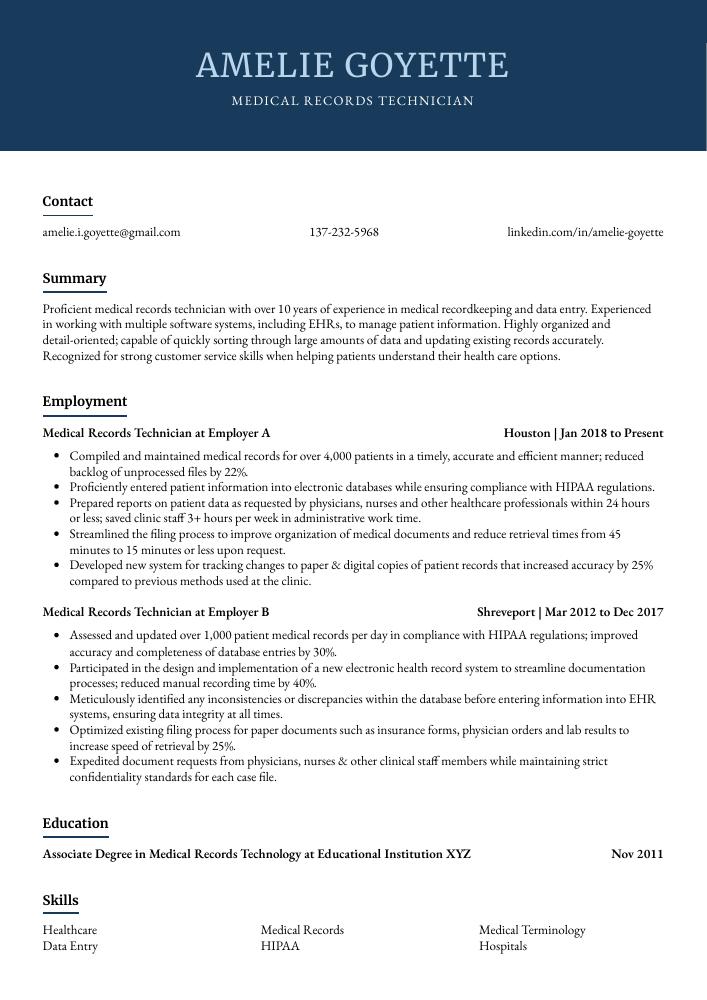Medical Records Technician Resume Guide
Medical Records Technicians manage, organize and store medical records. They ensure that all patient data is accurate, complete and secure. They also process requests for information from insurance companies or other healthcare providers, as well as update existing records with new information such as test results or treatments.
Your expertise in managing medical records is unparalleled. But potential employers won’t know that unless you make it clear on your resume. Create a document that demonstrates why you’re the perfect fit for the job and watch as opportunities come rolling in!
This guide will walk you through the entire process of creating a top-notch resume. We first show you a complete example and then break down what each resume section should look like.
Table of Contents
The guide is divided into sections for your convenience. You can read it from beginning to end or use the table of contents below to jump to a specific part.
Medical Records Technician Resume Sample
Amelie Goyette
Medical Records Technician
amelie.i.goyette@gmail.com
137-232-5968
linkedin.com/in/amelie-goyette
Summary
Proficient medical records technician with over 10 years of experience in medical recordkeeping and data entry. Experienced in working with multiple software systems, including EHRs, to manage patient information. Highly organized and detail-oriented; capable of quickly sorting through large amounts of data and updating existing records accurately. Recognized for strong customer service skills when helping patients understand their health care options.
Experience
Medical Records Technician, Employer A
Houston, Jan 2018 – Present
- Compiled and maintained medical records for over 4,000 patients in a timely, accurate and efficient manner; reduced backlog of unprocessed files by 22%.
- Proficiently entered patient information into electronic databases while ensuring compliance with HIPAA regulations.
- Prepared reports on patient data as requested by physicians, nurses and other healthcare professionals within 24 hours or less; saved clinic staff 3+ hours per week in administrative work time.
- Streamlined the filing process to improve organization of medical documents and reduce retrieval times from 45 minutes to 15 minutes or less upon request.
- Developed new system for tracking changes to paper & digital copies of patient records that increased accuracy by 25% compared to previous methods used at the clinic.
Medical Records Technician, Employer B
Shreveport, Mar 2012 – Dec 2017
- Assessed and updated over 1,000 patient medical records per day in compliance with HIPAA regulations; improved accuracy and completeness of database entries by 30%.
- Participated in the design and implementation of a new electronic health record system to streamline documentation processes; reduced manual recording time by 40%.
- Meticulously identified any inconsistencies or discrepancies within the database before entering information into EHR systems, ensuring data integrity at all times.
- Optimized existing filing process for paper documents such as insurance forms, physician orders and lab results to increase speed of retrieval by 25%.
- Expedited document requests from physicians, nurses & other clinical staff members while maintaining strict confidentiality standards for each case file.
Skills
- Healthcare
- Medical Records
- Medical Terminology
- Data Entry
- HIPAA
- Hospitals
- Healthcare Information Technology
- EMR
- Healthcare Management
Education
Associate Degree in Medical Records Technology
Educational Institution XYZ
Nov 2011
Certifications
Registered Health Information Technician (RHIT)
American Health Information Management Association
May 2017
1. Summary / Objective
Your resume summary/objective should be a concise description of your skills and experience as a medical records technician. It should give the hiring manager an overview of what you have to offer, such as your expertise in maintaining patient files, processing insurance claims, and ensuring accuracy in all data entry tasks. You could also mention any certifications or awards that demonstrate your commitment to excellence in this field. By highlighting these accomplishments up front, you can make sure the employer takes notice of them right away!
Below are some resume summary examples:
Passionate medical records technician with 5+ years of experience in healthcare data management, including medical coding and auditing. Experienced at handling patient information with utmost confidentiality. At XYZ Hospital organized over 50,000 paper charts into electronic health record (EHR) system to improve workflow efficiency by 40%. Received commendation from the Chief Medical Officer for my work on streamlining document processes.
Reliable Medical Records Technician with 7+ years of experience in a fast-paced hospital setting. Adept at accurately organizing, coding, and maintaining medical records while ensuring patient confidentiality. At Medical Center ABC achieved an average of 95% accuracy rate when entering data into the EMR system. Seeking to join XYZ Hospital’s team to continue providing top-notch healthcare services with attention to detail and compassion.
Diligent medical records technician with 7+ years of experience in medical coding, data entry, and patient recordkeeping. Skilled at organizing large volumes of medical information while ensuring accuracy and confidentiality. At XYZ Clinic, developed a system for tracking patients’ medical information to improve efficiency by 20%. Received multiple awards from the clinic management team regarding professionalism and attention to detail.
Seasoned medical records technician with 10+ years of experience in medical coding, HIPAA compliance, and patient data management. Seeking to join ABC Hospital as a Medical Records Technician where I can leverage my expertise in processing data from multiple sources to ensure accurate patient documentation. Key accomplishments include streamlining the filing process by 30%, leading to improved efficiency within the department.
Enthusiastic medical records technician with 5+ years of experience in maintaining and organizing medical files. Highly experienced in ICD-10 coding, HIPAA compliance regulations, data entry, quality assurance auditing and chart abstraction. At XYZ Clinic, led a successful project to transition the facility’s paper charts into an electronic health record system resulting in improved efficiency by 30%.
Hard-working and detail-oriented Medical Records Technician with 7+ years of experience maintaining patient records for a variety of healthcare providers. Skilled in filing, coding and indexing medical documents according to industry standards. Seeking to join ABC Healthcare as the new Medical Records Technician and use expertise in data analysis and HIPAA compliance policies to enhance operations.
Determined medical records technician with 5+ years of experience managing patient data. Highly skilled in accurately entering, updating and retrieving confidential medical information while adhering to HIPAA compliance standards. Seeking to join ABC Medical Center as a healthcare professional where I can help ensure efficient operations by streamlining digital record-keeping processes.
Detail-oriented medical records technician with 3+ years of experience in medical coding and data entry. Passionate about helping to ensure accurate, up-to-date patient information for ABC Medical Center. In 2019, identified a critical discrepancy between ICD codes that saved the hospital $60K in incorrect charges.
2. Experience / Employment
For the experience section, you should provide details on your employment history. This section should be written in reverse chronological order, meaning the most recent job is listed at the top.
When providing information about what you did in each role, stick to bullet points; this makes it easier for a reader to take in all of the information quickly and efficiently. When writing out these bullets, make sure that they are detailed and include quantifiable results whenever possible.
For example, instead of saying “Organized medical records,” you could say “Successfully organized 10+ patient charts per day according to HIPAA regulations; reduced filing errors by 25%.”
To write effective bullet points, begin with a strong verb or adverb. Industry specific verbs to use are:
- Organized
- Processed
- Filed
- Updated
- Scanned
- Monitored
- Assessed
- Analyzed
- Researched
- Compiled
- Entered
- Retrieved
- Confirmed
- Secured
Other general verbs you can use are:
- Achieved
- Advised
- Coordinated
- Demonstrated
- Developed
- Expedited
- Facilitated
- Formulated
- Improved
- Introduced
- Mentored
- Optimized
- Participated
- Prepared
- Presented
- Reduced
- Reorganized
- Represented
- Revised
- Spearheaded
- Streamlined
- Structured
- Utilized
Below are some example bullet points:
- Reduced turnaround time of medical records requests by 30%, improving patient-care efficiency and reducing billing backlog.
- Represented the organization at various departmental meetings, providing updates on privacy regulations and data security procedures to ensure compliance with HIPAA standards.
- Spearheaded a project which successfully automated key processes in maintaining patient information databases, resulting in a 20% decrease in manual paperwork errors over six months.
- Advised healthcare professionals on best practices for inputting accurate data into Electronic Health Records (EHR) systems; trained 15 new hires within 3 weeks of onboarding period completion rate achieved 100%.
- Actively collaborated with IT department to develop innovative solutions for resolving system related issues while managing confidential documents securely.
- Researched, updated and maintained medical records for over 250 patients in a timely manner, ensuring accuracy of information with 95% accuracy rate.
- Demonstrated expertise in filing, archiving and retrieving sensitive patient data while following strict HIPAA protocols to ensure confidentiality.
- Formulated detailed reports from medical record entries for physicians’ review purposes; reduced patient’s wait time by 25%.
- Successfully managed the release of confidential documents according to legal requirements within 24 hours or less per request; improved response times by 30%.
- Retrieved accurate documentation from paper-based systems as well as electronic databases and stored them securely on file servers; increased organizational efficiency by 40%.
- Facilitated the storage of over 10,000 medical records in a secure and organized manner while adhering to HIPAA regulations.
- Achieved 95% accuracy on patient information updates, ensuring the correctness of all data entered into the computer system.
- Confirmed that all patient files were up-to-date by verifying insurance coverage and other pertinent documents; reduced errors by 15%.
- Secured access to confidential health records with advanced encryption technologies, preventing unauthorized viewing or manipulation of sensitive data at all times.
- Competently managed requests for copies of medical records from various healthcare professionals within 24 hours or less; increased customer satisfaction ratings by 20%.
- Improved accuracy of patient medical records by verifying and validating information, ensuring all documents were up to date with a 95% accuracy rate.
- Utilized electronic health record systems to store, retrieve and analyze data for over 2,000 patients; monitored charts regularly for completeness and accuracy.
- Coordinated the retrieval of paper-based medical records from multiple departments within 48 hours or less in response to urgent requests from doctors & nurses.
- Updated existing databases with new admissions/discharges information as well as changes in medications, procedures etc., executing this task accurately on average 3 minutes faster than industry standard timescales per entry.
- Independently created updated summaries of patient conditions based on review of clinical notes while maintaining confidentiality standards at all times; achieved 100% compliance rating when tested against HIPAA regulations during annual audit reviews.
- Processed and maintained over 200 medical records daily with accuracy, ensuring that all information was correctly filed and stored in an organized electronic database.
- Thoroughly reviewed patient documents for completeness, accuracy and compliance to HIPAA regulations; identified and corrected errors resulting in a 25% increase of quality assurance scores.
- Mentored junior employees on the proper methods of filing medical records while providing feedback to ensure standards were met at all times.
- Reorganized existing medical record system by creating an indexing method which allowed quick retrieval of information; increased efficiency level by 20%.
- Structured new employee onboarding process to provide comprehensive training on coding procedures, data entry techniques as well as applicable laws & guidelines relevant for the role; trained 4 new staff members successfully within 2 weeks period each time.
- Organized and maintained medical records for over 500 patients in accordance with HIPAA regulations, increasing accuracy of data entry by 25%.
- Effectively analyzed patient information to ensure completeness and accuracy of reports; identified discrepancies in paperwork and rectified them in a timely manner.
- Analyzed scanned images for potential errors prior to entering into the system, resulting in fewer mistakes during documentation processing.
- Presented simplified summaries on complex topics such as lab results or medication instructions to physicians, nurses and other healthcare professionals upon request; saved time spent researching each case individually by 45 minutes per day on average.
- Filed all paper records properly according to established guidelines while adhering strictly to confidentiality requirements; successfully reduced retrieval times from 10 minutes down to 5 minutes per record when needed.
- Scanned over 2,000 medical records into a digital database, using advanced OCR software to ensure accuracy and efficiency.
- Revised patient information on over 500 records in the system while monitoring data quality metrics; reduced record errors by 15%.
- Monitored the organization’s compliance with HIPAA regulations and other relevant legal standards pertaining to health-related documentation.
- Entered up-to-date patient information into electronic systems such as EMR/EHR databases, ensuring that all changes were accurately documented for future reference.
- Confidently answered inquiries from patients or external organizations regarding their medical records; provided timely responses within 24 hours of request receipt in 95% of cases.
3. Skills
Skill requirements will differ from employer to employer – this can easily be determined via the job advert. Organization ABC may be looking for someone who is familiar with coding medical records, while Organization XYZ may require familiarity with electronic health record (EHR) systems.
It’s important to tailor the skills section of your resume to each job that you are applying for as many employers use applicant tracking systems these days which scan resumes for certain keywords before passing them on to a human.
In addition to listing relevant skills in this section, it’s also beneficial to discuss specific ones in more detail elsewhere on your resume – such as the summary or experience sections – so that recruiters can get an even better understanding of what makes you qualified for the role.
Below is a list of common skills & terms:
- CPR Certified
- CPT
- Data Entry
- EHR
- EMR
- Electronic Medical Record
- HIPAA
- Health Information Management
- Healthcare
- Healthcare Information Technology
- Healthcare Management
- Hospitals
- Medical Billing
- Medical Coding
- Medical Records
- Medical Terminology
- Nursing
- Patient Safety
- Software Documentation
- Team Leadership
- Teamwork
- Time Management
- U.S. Health Insurance Portability and Accountability Act
4. Education
Mentioning your education on your resume is dependent on how far into your career you are. If you recently graduated and have no prior experience, include an education section below your resume objective. However, if you have been working as a medical records technician for years with plenty of responsibilities to showcase, omitting the education section may be more appropriate.
If including an education section, try to mention courses and subjects related to the medical records technician role that will help demonstrate why you’re qualified for the job.
Associate Degree in Medical Records Technology
Educational Institution XYZ
Nov 2011
5. Certifications
Certifications demonstrate to potential employers that you have the necessary skills and knowledge for a particular job. They also show that you are committed to staying up-to-date with industry trends and best practices.
If there is a certification related to the position you are applying for, make sure it is included in your resume so hiring managers can see how qualified and knowledgeable you are about the field.
Registered Health Information Technician (RHIT)
American Health Information Management Association
May 2017
6. Contact Info
Your name should be the first thing a reader sees when viewing your resume, so ensure its positioning is prominent. Your phone number should be written in the most commonly used format in your country/city/state, and your email address should be professional.
You can also choose to include a link to your LinkedIn profile, personal website, or other online platforms relevant to your industry.
Finally, name your resume file appropriately to help hiring managers; for Amelie Goyette, this would be Amelie-Goyette-resume.pdf or Amelie-Goyette-resume.docx.
7. Cover Letter
Providing a cover letter with your job application is a great way to make sure you stand out from the crowd. It’s an opportunity for you to explain why you are the ideal candidate and give employers more insight into who you are as a professional.
Cover letters should be between 2-4 paragraphs long and typically focus on topics such as why this role interests you, what sets yourself apart from other applicants, key skills or experiences that could benefit the position, etc. Having one can help demonstrate your enthusiasm for the role and increase your chances of getting hired!
Below is an example cover letter:
Dear Zaria,
I am writing to apply for the Medical Records Technician position at XYZ Hospital. I am a medical records professional with over 10 years of experience in the field. In my current role as Lead Medical Records Technician at ABC Clinic, I oversee the work of a team of five technicians while also maintaining my own caseload. I have a strong knowledge of medical terminology and experience working with Electronic Health Records (EHRs).
In my previous roles, I have gained experience working with different types of medical records, including paper charts and electronic databases. I have also developed strong organizational skills that allow me to keep track of large volumes of information. My attention to detail ensures that all records are accurate and up-to-date. In addition, I have excellent customer service skills and enjoy working with patients and their families.
I am confident that I can be an asset to your organization as a Medical Records Technician. My experience and skills will contribute to the efficient operation of your medical records department. I look forward to speaking with you about this opportunity in the future. Thank you for your time and consideration.
Sincerely,
Amelie
Medical Records Technician Resume Templates
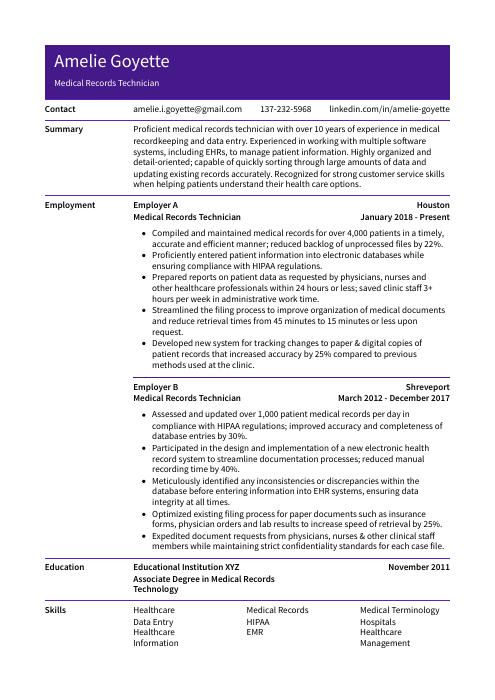 Pika
Pika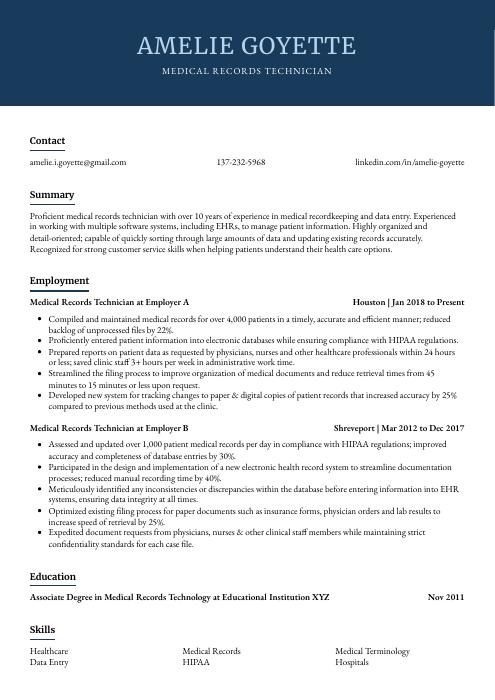 Bonobo
Bonobo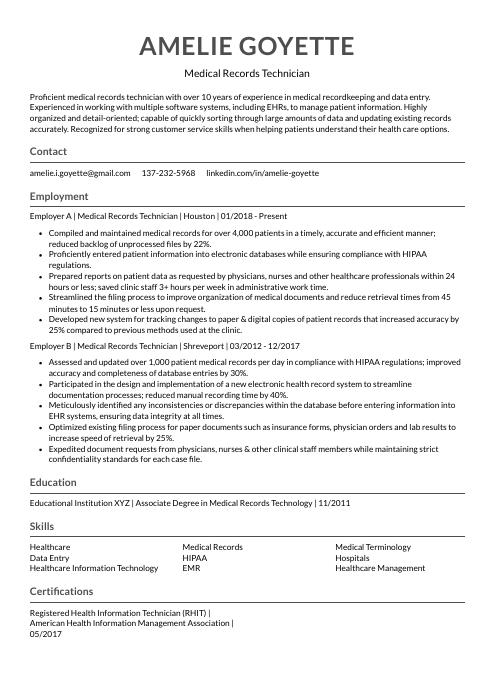 Indri
Indri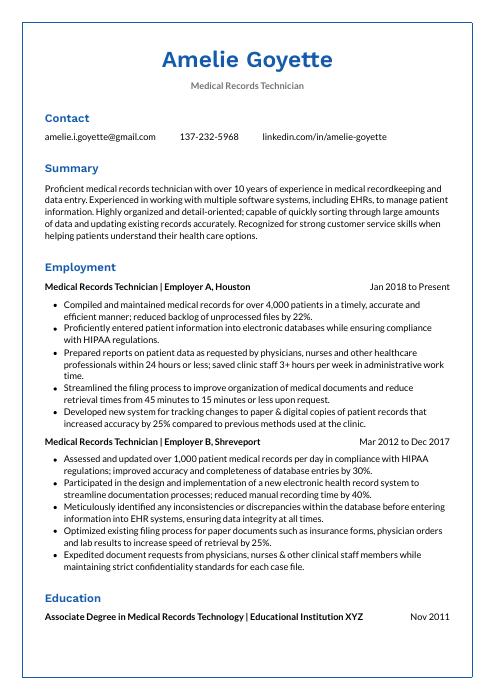 Markhor
Markhor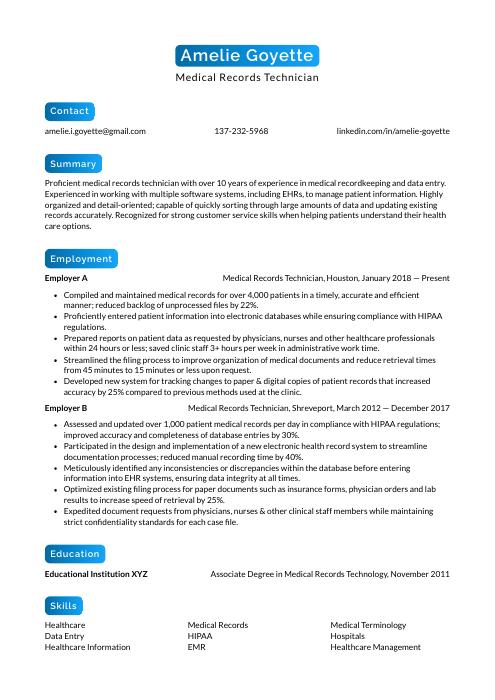 Kinkajou
Kinkajou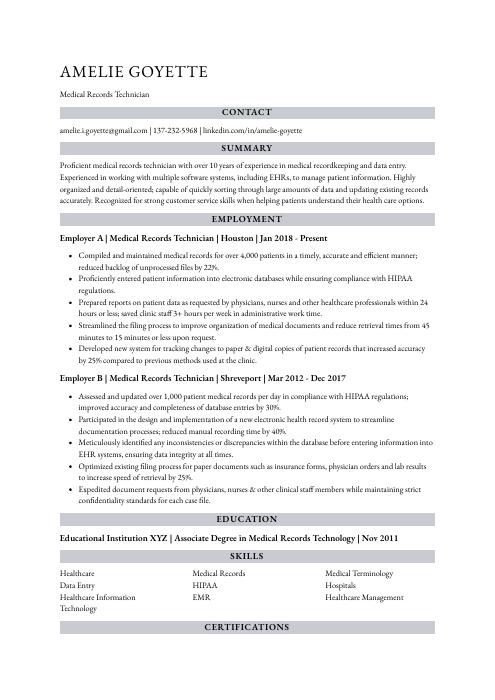 Numbat
Numbat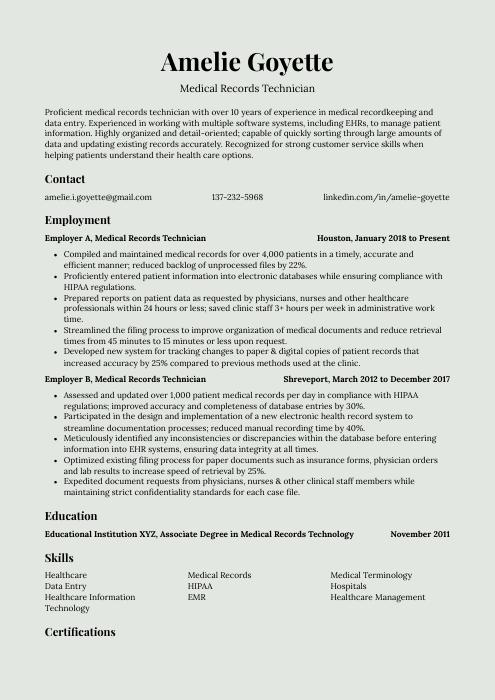 Saola
Saola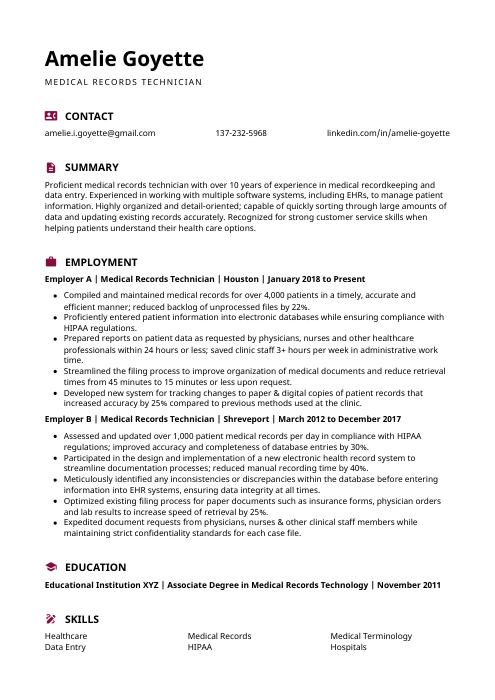 Hoopoe
Hoopoe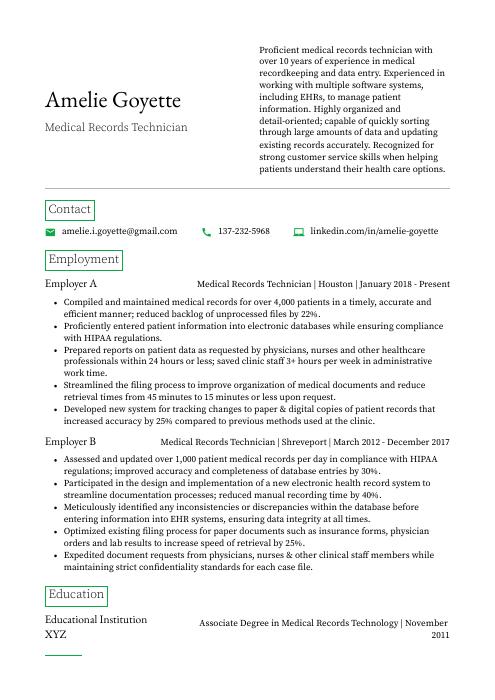 Quokka
Quokka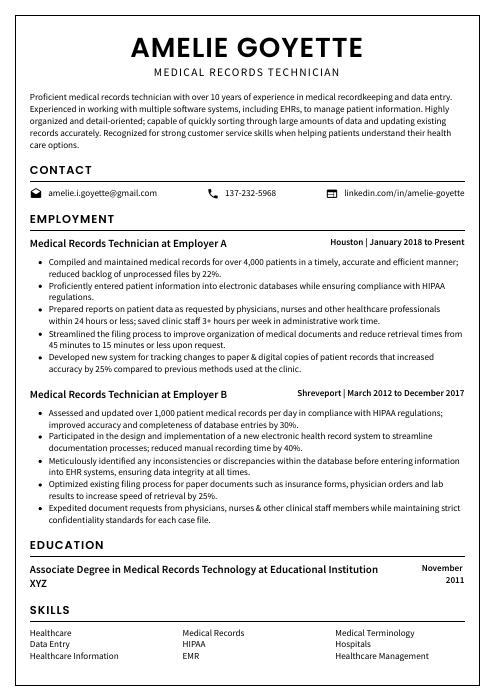 Cormorant
Cormorant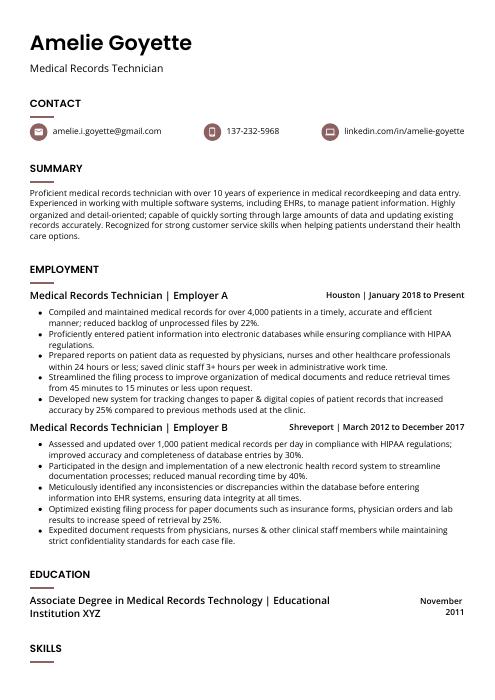 Fossa
Fossa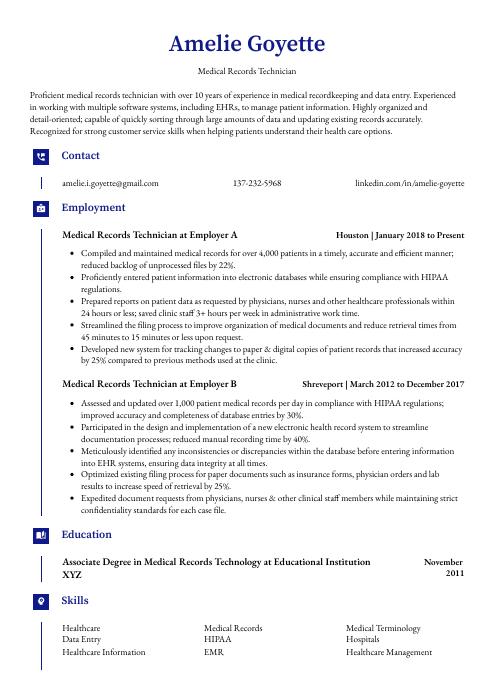 Gharial
Gharial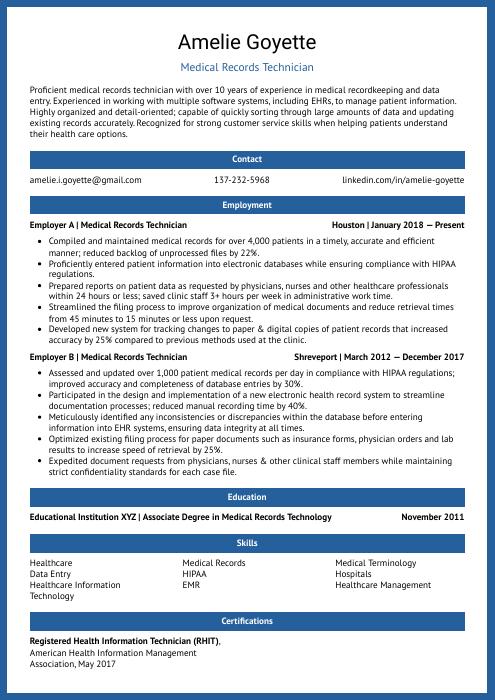 Ocelot
Ocelot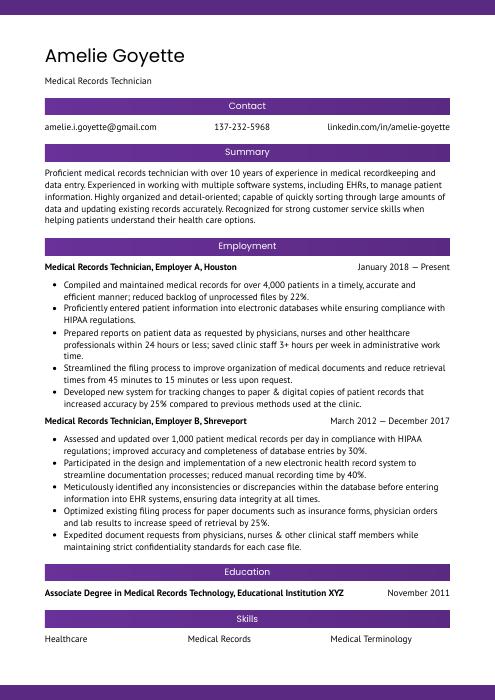 Jerboa
Jerboa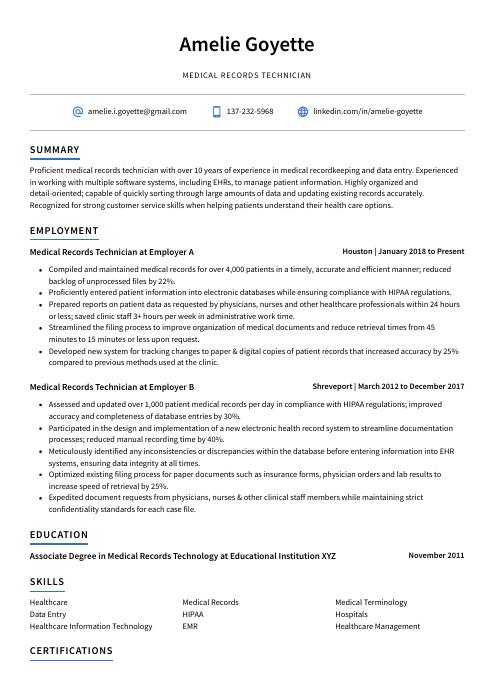 Axolotl
Axolotl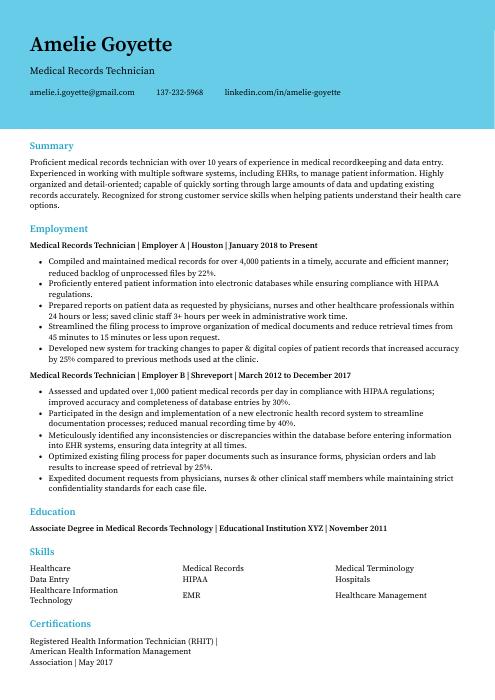 Dugong
Dugong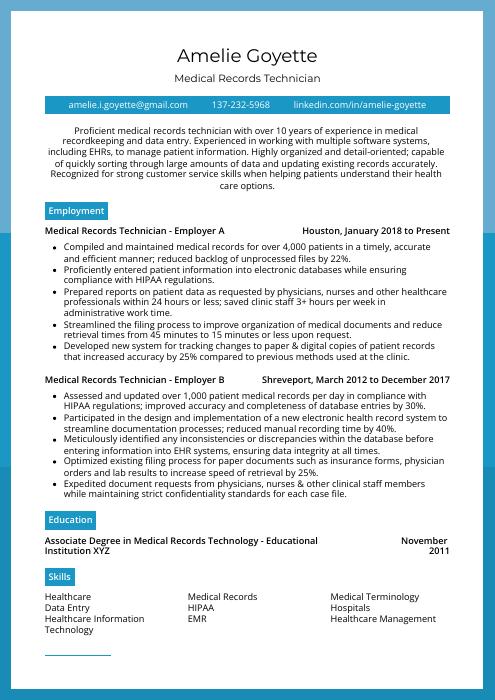 Rhea
Rhea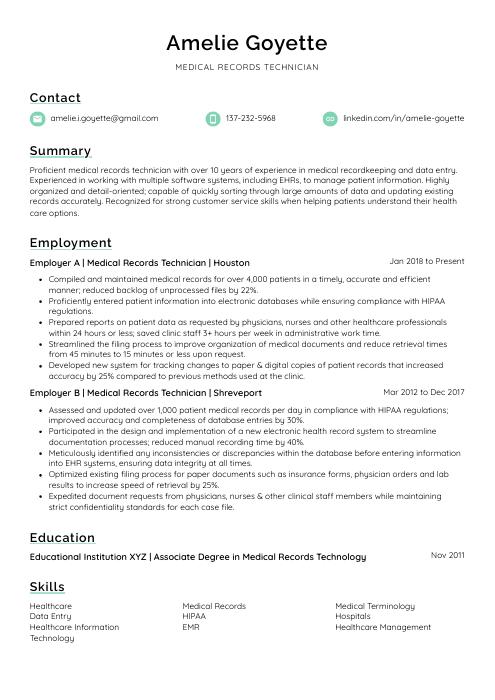 Lorikeet
Lorikeet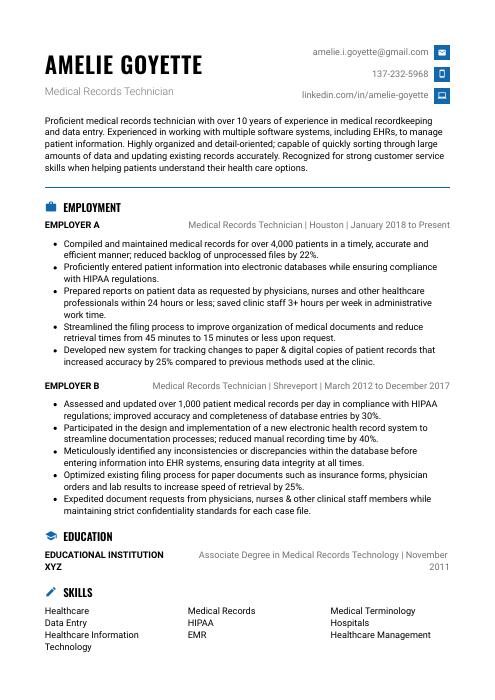 Echidna
Echidna Rezjumei
Rezjumei
